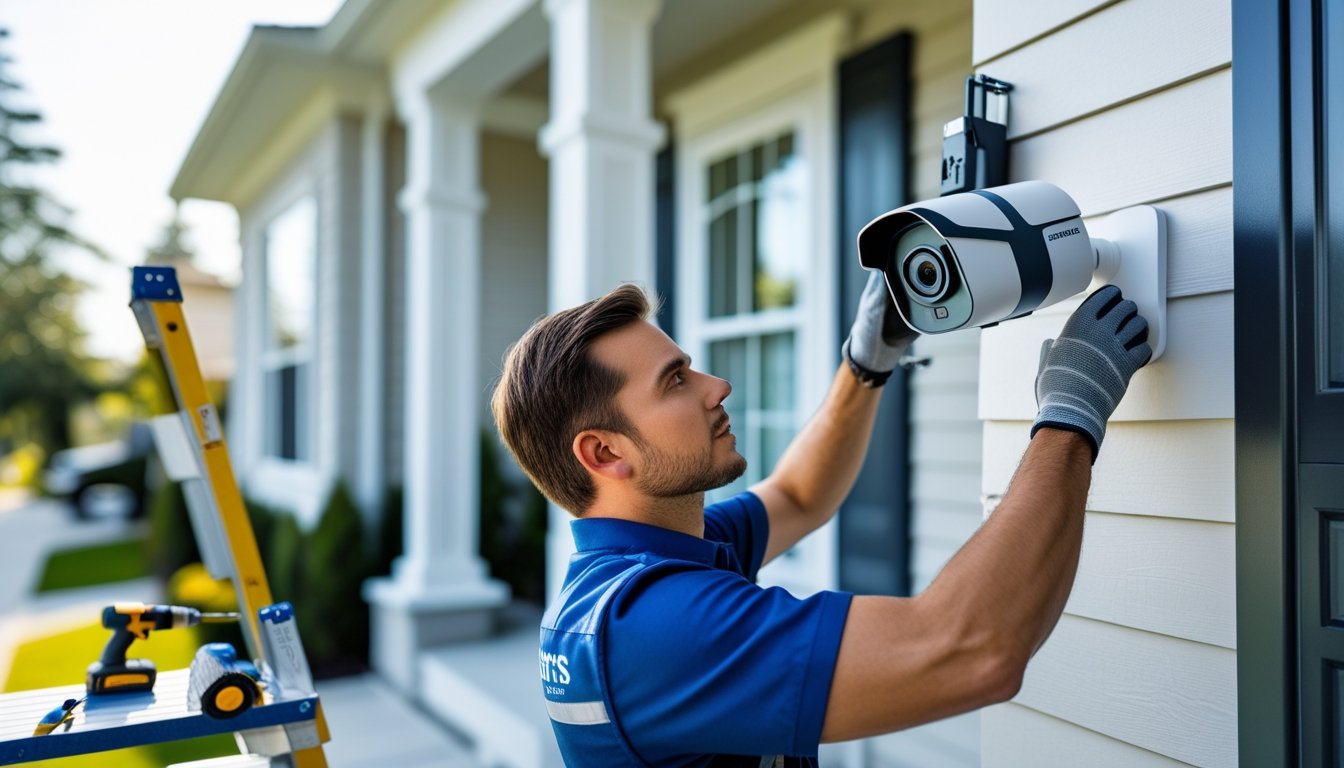Installing a home security system is a crucial decision for protecting your property and loved ones. As you consider enhancing your home’s safety, it’s essential to know whether you need a permit to operate your security system. In many areas, including the greater Houston area, obtaining a permit for a monitored alarm system is often a requirement.
You might be surprised to learn that failure to secure the necessary permits can result in fines or complications with emergency responses. Many jurisdictions, including cities like Dallas, mandate permits to ensure that alarm systems are registered and able to communicate effectively with local law enforcement. Understanding these regulations not only helps in maintaining compliance but also maximizes the effectiveness of your security measures.
Navigating the permitting process can feel overwhelming, but being informed is your best strategy. This article will break down what you need to know, including specific requirements in your area, potential costs, and the benefits of having a permit for your home security system. With this knowledge, you can make a well-informed decision and ensure your home remains a safe haven.
Understanding Home Security System Permits
Obtaining the correct permits for a home security system is essential to ensure compliance with local regulations. This section provides crucial information on what a permit is, the types of security systems that may require them, and who is responsible for the application process.
What Is a Home Security System Permit
A home security system permit is an official approval issued by local authorities that allows homeowners to install and operate a security alarm system. This permit helps regulate the use of alarms to minimize false alarms and ensure efficient emergency response.
In most jurisdictions, having a monitored alarm system requires you to obtain this permit. It often involves filling out an application and paying a fee, which can vary by location. Some areas may also require additional documentation, such as proof of residence or system specifications.
Types of Security Systems That May Require Permits
Various security systems may need a permit. These typically include:
- Monitored Alarm Systems: These are connected to a monitoring service that alerts authorities during an emergency.
- Alarm Systems with Smoke Detection: Systems that include smoke detectors might require separate permits for compliance.
- Unmonitored Systems: Some jurisdictions require permits even for unmonitored systems, particularly if they have loud sirens.
Always check local regulations to confirm whether a permit is necessary. For example, in Houston, many homeowners must obtain an alarm permit to ensure their system meets city codes and requirements.
Who Needs to Apply for a Permit
The permit application is generally the responsibility of the homeowner or property manager. In some cases, security companies may assist with the application process, but ultimately, it’s your responsibility to ensure compliance.
When applying, be prepared to provide the following details:
- Your name and contact information
- Property address
- Type of security system being installed
Incomplete applications might delay your permit approval. Therefore, double-check that all information is accurate and up to date before submission. Failure to obtain a proper permit can lead to fines and complications with your local authorities, so it's in your best interest to comply with these regulations.
Legal Requirements for Home Security Permits
Understanding legal requirements for home security permits is essential for homeowners. Many municipalities, including those in Harris County, have specific regulations that can impact your security system installation. These requirements often involve permits that help local law enforcement manage alarm responses effectively.
Permit Regulations by Jurisdiction
Permit regulations vary significantly by jurisdiction. In Harris County, you may need an alarm permit if your system is monitored. Some municipalities mandate separate permits for systems with smoke detection features. Failure to obtain the necessary permits could lead to fines or difficulties during emergency situations.
Local policies typically include application processes, fees, and renewal requirements. By using resources provided by your county or municipality, you can ensure compliance. Always check local regulations before installing a home security system.
How Local Ordinances Affect Homeowners
Local ordinances are crucial for establishing guidelines around home security systems. In many areas, these laws aim to reduce false alarms and streamline responses during emergencies. If your alarm system triggers false alerts frequently, you could face fines and increased scrutiny from local law enforcement.
Being informed about these ordinances can save you money and hassle. Additionally, some local regulations may require you to register your monitoring service. Staying compliant with these rules helps ensure better service and faster response times when you need it most.
Role of the Local Police Department
The local police department plays a significant role in the enforcement of permit regulations. When you install a monitored alarm system, the police department may need to access your information to respond properly to alarms. They often require registration of the system to avoid unnecessary responses to false alarms.
In Harris County, the police department provides guidelines on how to register your alarm system. Keeping your information updated ensures prompt responses during emergencies. Being proactive with local law enforcement can create a safer environment for you and your neighbors.
Application Process for an Alarm Permit
Obtaining an alarm permit is essential for installing a monitored home security system in many municipalities. This process typically involves several steps, specific information requirements, and the option to submit your application online or via email.
Steps to Obtain a Permit
To begin the application process, first, contact your local municipality to confirm the need for an alarm permit. Requirements can vary widely depending on your specific location in the greater Houston area.
Next, complete the necessary application form, which could often be found on your city’s official website. Be prepared to pay any applicable fees during this stage.
After submitting your application, wait for confirmation from your local authorities. They will typically assess your request, which may take several days to process. Ensuring that your information is accurate can help expedite this timeline.
Information Required During Application
When applying for an alarm permit, you will need to provide specific details about your security system. This generally includes:
- Your contact information: Name, address, and phone number.
- Alarm company details: The name and contact information of your security provider.
- Alarm system specifics: Type of system, whether it includes fire or carbon monoxide detection, and operational details.
Additional documentation such as proof of installation may also be required. Ensure that all information is accurate, as discrepancies can lead to delays or permit denial.
Submission Methods: Online and Email Options
Many municipalities allow you to submit your alarm permit application online. Visit your local government website to access the form and guide you through the submission process.
If online submission is not available, you can often submit your application via email. Ensure you attach all required documents and clearly state your intention to apply for a permit.
Be sure to keep a copy of your completed application and any correspondence with your municipality. This can be useful for tracking the permit status and for future reference.
Consequences of Not Having a Permit
Failing to obtain a permit for your home security system can lead to significant repercussions for you, the homeowner, as well as the alarm company involved. Understanding these consequences is crucial to ensure compliance and avoid unnecessary costs.
Fines and Penalties
Many cities and counties enforce strict regulations regarding alarm permits. If emergency services respond to a false alarm at your residence without a valid permit, you may face hefty fines. These fines can range from $100 to over $1,000, depending on local laws.
In addition to fines, some jurisdictions implement penalties for repeated false alarms. You could find yourself in a situation where the number of allowed false alarms is limited. Exceeding this limit may result in escalating fines or even denial of service, which can impact your safety.
Impact on Homeowners and Alarm Companies
Your failure to secure an alarm permit not only affects you but also impacts the alarm companies you work with. If your system is not permitted and triggers a police response, the alarm company may face consequences as well. They might refuse to service or monitor unpermitted systems.
Additionally, without a permit, you risk having your alarm system become ineffective. If authorities are dispatched multiple times for unpermitted alarms, they may stop responding altogether, leaving you vulnerable. Homeowners must weigh these risks carefully to maintain both legal compliance and personal safety.
Managing False Alarms and Permit Compliance
Understanding the relationship between alarm permits and false alarms is crucial for effective management of your home security system. Proper compliance can reduce both the frequency of false alarms and potential penalties from local authorities.
How Permits Help Handle False Alarms
Alarm permits are essential for legally operating a security system in Houston. Without a permit, your false alarms may result in fines, as local police departments track repeated incidents. If you do have a permit and experience false alarms, the police may be less likely to respond.
Permits establish a formal record of your alarm system, which can assist authorities in identifying patterns of false alarms associated with your address. This can facilitate improved response and help you find solutions to minimize unnecessary alerts.
Preventing False Alarm Incidents
To minimize false alarms, ensure your system is installed correctly by a reputable company familiar with Houston regulations. Schedule periodic inspections for the alarm equipment to ensure reliability.
Additionally, educate all household members on how to operate the system properly. Simple actions, like remembering to disable the alarm when entering or leaving, can prevent many accidental triggers.
You may also consider implementing additional features such as two-way audio or video verification. This allows monitoring personnel to confirm whether an alarm is genuine before contacting local police.
Best Practices for Alarm System Owners
As a responsible alarm system owner, develop a routine to test your system regularly. This practice helps identify potential issues before they escalate into false alarms.
Keep updated contact information with your local police department regarding your alarm system. This ensures they have the correct details when responding to an alert.
Make use of alarm system features that provide notifications directly to your mobile device. This allows you to manage alerts promptly, reducing the likelihood of false alarms triggered by user error.
By combining these practices with compliance to local permit requirements, you can significantly improve your security system’s effectiveness while minimizing unnecessary disruptions.
Frequently Asked Questions
Understanding the requirements surrounding home security system permits can help you navigate the process more smoothly. This section addresses common queries related to obtaining, costs, and regulations surrounding alarm permits.
How can I obtain a permit for my alarm system?
To obtain a permit for your alarm system, you typically need to contact your local police department or city government. They may have an online application process or require you to visit their office in person. Be prepared to provide details about your system and any necessary fees.
Is an alarm permit required for all home security systems?
Not all home security systems require a permit. Generally, if your system is monitored by a third party, a permit is necessary. Systems that you install and operate independently might not need a permit, but this varies by jurisdiction.
What is the cost associated with obtaining a home alarm permit?
The cost of a home alarm permit can vary widely depending on your location. Some areas may charge a nominal fee, while others could have higher costs. It’s advisable to check with your local authority for specific fee structures.
What are the consequences for not having an alarm system permit?
Failure to obtain the necessary alarm permit can lead to fines or penalties. Additionally, not having a permit may result in emergency responders being delayed in response to an alarm trigger, as they might prioritize verified alarms.
How do I renew my existing home security system permit?
Renewing your alarm permit usually involves contacting the issuing authority. You may need to fill out a renewal form and possibly pay a renewal fee. Check with your local police or relevant authority for specific procedures and timelines.
Are there any specific regulations for home security system permits by state?
Yes, regulations for home security system permits vary by state and sometimes by city. Each state may have different requirements regarding permit applications, fees, and enforcement. Research your specific state’s regulations to ensure compliance.
.svg)



.svg)


.svg)



